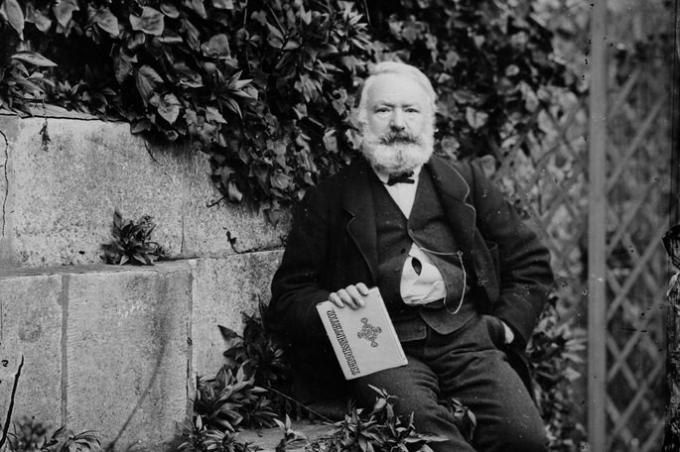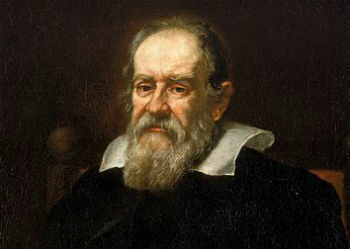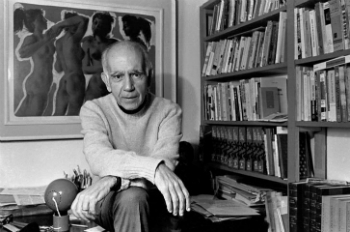Victor Hugo (1802-1885) was a renowned French writer, artist and politician.
His work is inserted in the period of romanticism, with two of his novels highlighted: The miserable and The Hunchback of Notre Dame.
Given his importance to world literature, his works have been translated into several languages.
Victor Hugo Biography
Victor-Marie Hugo was born on February 26, 1802 in the French city of Besançon.
Son of Sophie Trébuchet (1772-1821) and Joseph Léopold Sigisbert Hugo (1774-1828), Victor was the couple's third and last child.
His father was an officer in Napoleon's army, so the family traveled a lot. So, from an early age, he and his brothers lived in some European cities like Paris, Naples and Madrid.
His literary talent was discovered early and at the age of just 15, Victo Hugo was awarded by the French Academy.
Shortly thereafter, he and his two brothers, Abel Hugo and Eugène Hugo, founded the magazine “Le Conservateur Littéraire” (The Literary Conservative).
With the collaboration of other French writers, Victor published his writings for two years, but in 1821 he left the magazine.
At the age of 20, he marries Adèle Foucher and has five children with her: Léopold Victor Hugo, Léopoldine Hugo, Charles Hugo, François-Victor Hugo and Adèle Hugo.
At this time, he began writing poetry and novels. Avid writer, he released his first poetic work “Odes and Various Poetry” in 1822. The following year, he publishes his first novel “Hans from Iceland”.
It is worth noting that in addition to poetry and novels, Victor wrote dramaturgy plays, the first of which was published in 1827: “Cromwell”.
Since then, Victor Hugo has come close to romantic ideals, being one of the main writers of this literary school. Already recognized, he was elected to the French Academy.
In addition to his literary life, Victor Hugo had a strong political presence, and became a member of the French Senate. Concerned about the conditions of citizens in the city of Paris, the writer was a liberal, human rights activist, and pro-free will.
After Napoleon III became President of the French Republic, Victor became disillusioned with his attitudes, and tried to organize a resistance movement. However, he was persecuted by the government and remains in exile for nearly 20 years in Brussels, Belgium, and on two Channel Islands: Jersey and Guernsey.
During the period of exile, Victor Hugo continues to write novels and poems, of which “The miserable”, published in 1862. In this work, the writer addresses the population's conditions of poverty.
With the fall of the empire, Victor Hugo returns to France and remains focused on politics, being elected deputy in 1870 and years later occupying the position of senator. Parallel to this, he continued writing until the end of his life.
Victor Hugo died in Paris, on May 22, 1885, at the age of 83.
Victor Hugo and romanticism
Victor Hugo was one of the most outstanding writers of romanticism in France. From a young age, he was inspired by the works of François-René de Chateaubriand, one of his favorite pre-romantic writers.
Much of his work deals with themes of feeling, freedom, politics and love.

In 1827, Victor published his work on dramaturgy “Cromwell”. In the preface to the book, considered the manifesto of romanticism, Victor presents a theory of romantic drama.
As early as 1831, he published “The Hunchback of Notre Dame”, novel that describes the passion of the hunchback Quasímodo for the gypsy Esmeralda.
In addition to this novel, Victor Hugo published in 1962 “The miserable” in which he addresses the issue of inequality and social injustice. This, without a doubt, was his most important work of the period.
“The miserable”, starring Jean Valjean, reveals the path of a poor man who, when stealing bread from a bakery to feed his family, remains imprisoned for years.
Works by Victor Hugo
With a vast literary work, Victor Hugo dedicated his life to literature and wrote novels, poetry and drama.
- Odes and Diverse Poetry (1822)
- Hans of Iceland (1823)
- Bug-Jargal (1826)
- Cromwell (1827)
- Marion of Lorme (1829)
- The Last Day of a Condemned to Death (1829)
- The Hunchback of Notre Dame (1831)
- Marion de Lorme (1831)
- Autumn Leaves (1831)
- Lucrezia Borgia (1833)
- Mary Tudor (1833)
- Twilight Tales (1835)
- Claude Gueux (1834)
- The Punishments (1853)
- The Legend of the Ages (1855-1876)
- The contemplations (1856)
- The Miserables (1862)
- William Shakespeare (1864)
- The Workers of the Sea (1866)
- The Man Who Laughs (1869)
- Ninety-three (1874)
- The Story of a Crime (1877)
Curiosity
The third romantic generation in Brazil became known as the "Hugoana Generation", as it was inspired by the social poetry of the French poet Victor Hugo.
Learn more about Romanticism in Brazil.



